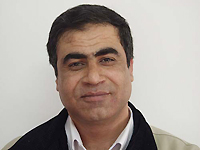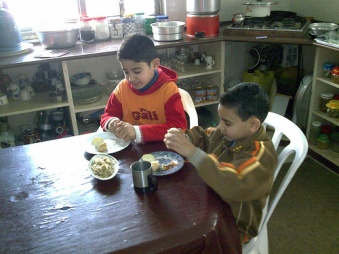
[ 2009.1.19 ]

Jawad Harb (C)CARE | Jawad Harb is a Palestinian living in Rafah, Gaza, with his wife and six children. Harb has worked with CARE since 2002, managing a program supporting women's centres in Gaza. Since the conflict began Dec. 27, Harb's program has stopped operating because of the constant bombing. |

Jawad's sons eat lunch in their home in Rafah, Gaza Strip (C)CARE
There was a community centre with ping pong, video games and a meeting room for the neighbourhood modern children's parliament, run by a local organization. The children would discuss issues related to children's rights. This was the biggest shock for my children, that this was destroyed. It's just rubble.
We visited my sister in Rafah City, and talked about the people we knew who had died. Our children played together, and my sister and I were listening to their innocent children's questions.
"Did you cry? I did not cry. I was very strong. Were you strong? Did you sleep well at night? Where did you sleep? Our father was home the whole time. He read us stories. Did your father read you stories?"
It was really funny, in a way, how they were almost comparing notes. But I worry about them, and how they are processing this.
Today, it is very quiet. I went downtown for shopping for the first time since this started. I bought fuel, vegetables, tomatoes, and cucumber. I even found meat. There was no fruit available, but I found a few oranges. Everything is very expensive. I am lucky, because I have a job, and I withdrew money before the conflict started. Most of my neighbours are not so lucky. There is no money in the banks.
The electricity came on for the first time last night at 9 p.m. The repairmen must have started working right after the ceasefire was called. The children watched cartoons on TV, looking like everything was normal. This morning my sons took the football, and went downstairs to collect other children to go play.
The children were supposed to go to school on Saturday, but the schools are being used as shelters now. My older daughters ask me, 'Dad, where will we go to school?' They want me to check with the Minister of Education, to find out when they can go back.
I'm on the balcony now, watching the whole neighbourhood. People are sitting outside, enjoying the sun, drinking tea, smiling. It all looks so normal.
Everyone is relieved that the ceasefire is here, but many people are worried about the damage to the people, to the infrastructure, to everything. Many people say the Gazans were abandoned by the whole world. There is so much damage, so many things destroyed.
One hundred dead bodies were discovered yesterday under the rubble. This is very shocking - they were there for weeks. In the silence, people are talking about their sadness. They are recalling their anguish.
It's not easy to forget the moments of the war. We are happy for the ceasefire, but there are no celebrations yet. We want a permanent peace. The blockade on Gaza must end. We hope that Gaza will open up to the rest of the world, and we can work, and live, just like everyone else. Tomorrow, I will go to work again for CARE. We will start to rebuild.
We are watching, waiting to see what comes next. But today, I am hopeful.